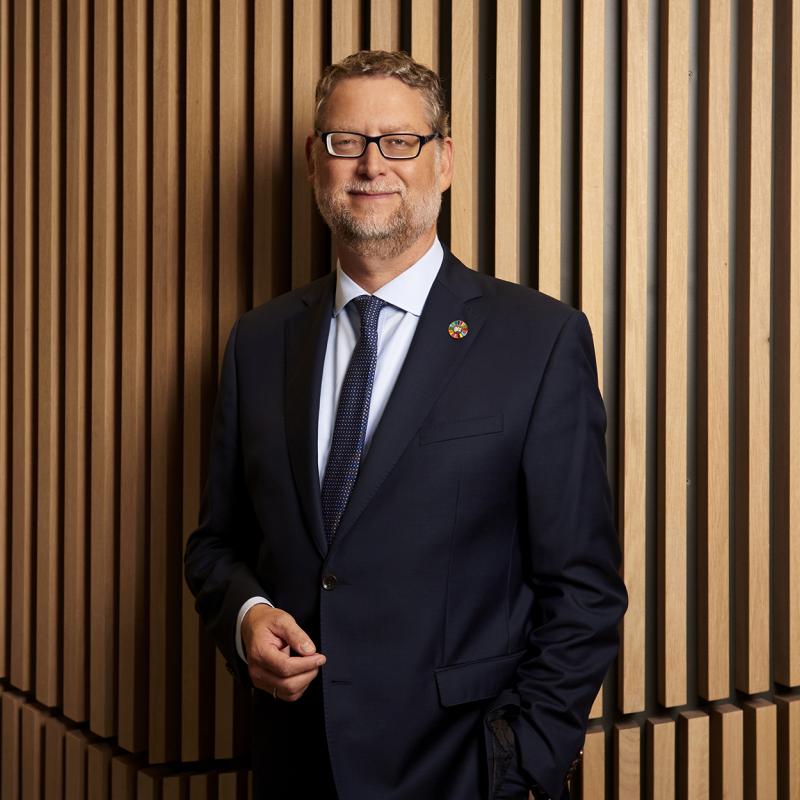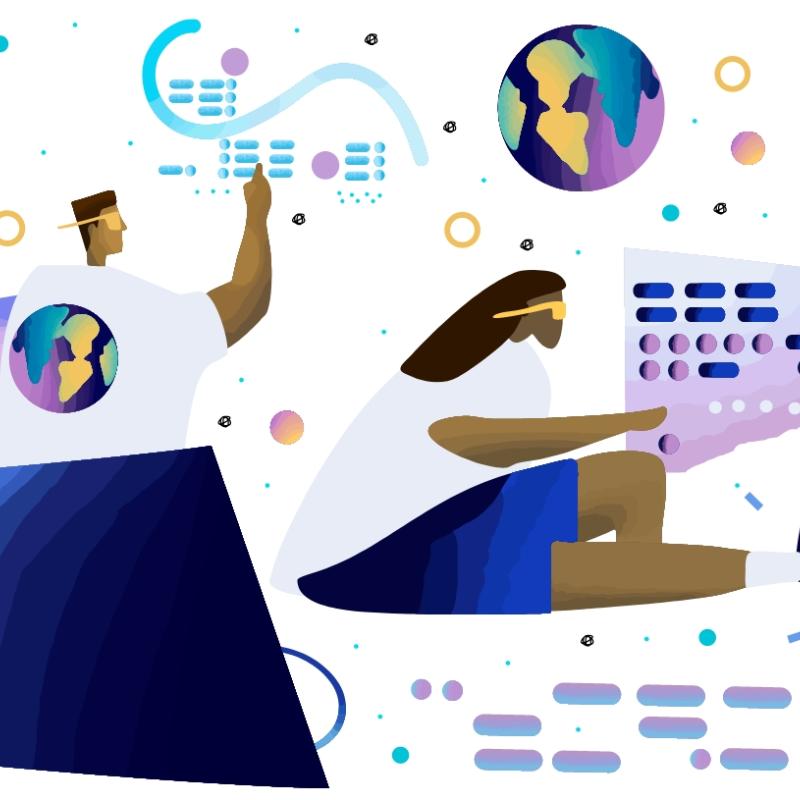 Gaby Gerster
Gaby Gerster
‘Digitalisation must serve the common good’
GIZ Managing Director Anna Sophie Herken on the status of digitalisation in international cooperation – and what re:publica has to do with it
Ms Herken, you are appearing at this year’s re:publica. Why?
re:publica is one of the most important forums for digitalisation and the digital society. GIZ is actively involved, and networks with civil society, the private sector and the players on the digital stage. We offer an international perspective and can present successful examples from our projects, but equally we can learn from other organisations.
The motto for this year’s re:publica is ‘Who cares?’ What does that have to do with GIZ’s work?
The motto couldn’t be more relevant for GIZ’s work. Our goal is to create a better life for everyone, especially the most vulnerable. Every individual is entitled to live in security and dignity. We work for sustainable development to ensure that future generations can also live well, worldwide.
We identify long-term solutions that work. To this end we bring people together, as equal partners. We work with local communities as we do with international organisations like the World Health Organization (WHO). We ‘care’, but not in a paternalistic manner. We care as partners.
At this point I feel it is important to stress that our work should not be confused with charity. The challenges of our time are, for the most part, international, or even global – wars, the climate crisis and pandemics. They affect us all, and they can only be resolved if we work together. At the end of the day then, Germany also benefits from GIZ’s work.
What part does digitalisation play in GIZ’s work?
Digitalisation is indispensable for international cooperation. Whether we’re talking about managing pandemics, tackling the climate crisis or delivering state services more rapidly – digitalisation can help master crises. In fact, digitalisation is crucially important for 70 per cent of the Sustainable Development Goals (SDGs). They will not be achieved without it. If we fail to attain the SDGs our world will be less safe and less equitable.
Where are our partners in terms of digitalisation? Are we talking about artificial intelligence or more about access to the digital world?
Roughly one third of the world’s population still has no access to the internet, with women and girls being affected disproportionately. There is also a vast gulf between urban and rural areas. And even when they have internet access, lots of people don’t know what to do with it.
The Global South risks being left behind when it comes to key technologies, like artificial intelligence. And finally, countries don’t necessarily have the political framework they need for the digital era. Surveillance, disinformation, manipulative algorithms, censorship, the misuse of personal data – these are all challenges that need to be addressed, if digitalisation is to serve the common good and focus on people.
Are there countries in the Global South that are ahead of us?
There are certainly a whole series of countries, like Rwanda for example, that are making impressive progress and are well ahead of us in some areas – like mobile payment. They have been quick to understand that digitalisation gives them the opportunity to simply skip entire development steps. We in Germany can also learn from their experience!
In what sectors do you think digitalisation offers the best prospects for development in poorer countries? How can GIZ support this process?
There are opportunities across all sectors. Digital technologies are at the heart of the ongoing transformation. We at GIZ support our partners with their digital transformation and help them harness the potential offered across the board, without exacerbating existing inequalities and dependencies. For this, we promote the use of open data, technological standards and open source products that are mutually compatible and affordable. In this way we want to help build a secure, sustainable digital infrastructure worldwide.
One of our concerns is to ensure easier access to digital technologies, because that makes it possible to genuinely harness the opportunities of digitalisation. We also provide advice on international regulations, like the Global Digital Compact currently being negotiated by the UN, as well as reliable rules at national level. If the rules are fair, people can use the full potential of digital technologies to benefit everyone, while minimising risks.
Health care is an area where the potential is huge. What can GIZ contribute in this area in particular?
The benefits in the health sector are particularly evident. During pandemics, for instance, hospitals, laboratories and authorities need access to real-time data, so that they can take decisions swiftly. We at GIZ realised this at an early stage and supported the establishment of robust infrastructure and smooth data sharing across national borders, on behalf of the German Federal Development Ministry. Projects like this can mitigate the risk of new pandemics and make for swifter, better coordinated action when crises strike.
What is the role of the private sector and tech companies in the digital transformation? How does GIZ cooperate with private companies?
In view of geopolitical interests and the dominant market position of some IT companies that is an important question for our partners. One thing is clear: tech companies are often at the forefront of innovation. Dialogue and cooperation with them thus offers huge potential for effective digitalisation. That is why we, at GIZ, also cooperate with IT businesses, digital economy associations and start-ups, for example to establish open data and training courses in the tech sector.
Private-sector innovations must not, however, widen digital divides with only a few benefiting from modern key technologies. We work as an honest broker, to ensure a fair reconciliation of interests and develop better ideas for all people.
How does GIZ intend to structure itself in future to support people and better manage global crises in a digital world?
The digital transformation will radically change GIZ, including the working and learning culture of our staff. At the moment we are putting the company on a secure, IT-based footing with digitalised processes. In future our work will be more data-based. We will develop technological solutions for our partners within strong cooperation arrangements. Changes are already well underway. GIZ will become more effective and more fit for the future, while streamlined processes will make our work more efficient. ‘Practised digitalisation’ like this will benefit GIZ, our commissioning parties and partners, and will bring us closer to our common goals. Of that I am convinced.
 Mirjam Knickriem
Mirjam Knickriem
Anna Sophie Herken, GIZ Managing Director


